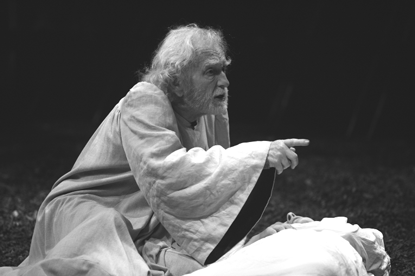Lear as the bard envisioned him
King Lear is a role most often undertaken by an actor past his prime who wants to prove to a portion of the world that he can still shake the rafters with Shakespearean verse. At least that’s been my unfortunate experience to date. I have seen at least a dozen productions that have radiated with linguistic proficiency and truly impressive scenery chewing, but without a shred of humanity.
Happily, the brilliant ensemble production of “King Lear” playing at La MaMa through July 2 only, balances the characters and the story with a grace and fluidity that makes it abundantly clear this is not a star vehicle or a pageant, but a transfixing thriller filled with intrigue and deception. The only ego strutting is in the script—just as Shakespeare wrote it. Simple in its construction and staging, but directed by Patrick Swanson with a rich understanding of the play’s complexity, this is the most exciting “Lear” I have ever seen. Throughout its three-and-a-half-hours, I was completely in the grip of the story and immersed in the dark and venal world of the play.
Ironically, this production works where others have failed because the ensemble is so central to Swanson’s direction. “King Lear” is not just the story of one man’s decline and fall. It is an epic illustration of how self-involvement can leave us vulnerable to evil. Lear banishes his daughter Cordelia for failing to flatter him appropriately, giving everything to her flattering—and really nasty—sisters, Goneril and Regan… and he meets with tragedy.
At the same time, Gloucester, a lord who remains loyal to Lear, believes ill of his son Edgar from his bastard son Edmund and effectively banishes him… and he too meets with tragedy. Both essentially good men are done in by how easily their egotism allows them to be manipulated.
Through the use of parallel plots and the thematic interdependency of Lear and Gloucester, Shakespeare portrays Lear’s tragedy as anything but unique. It is, in fact, that self-centeredness is a common—and lethal—human condition. The moral is not, “don’t give away your real estate too soon because your ungrateful kids will turn you out.” It is,“man’s tragedy is that he lives in a hell of his own making.”
Alvin Epstein is captivating as Lear. He fully mines the complexity of the character, and his concurrent descent into death and growing awareness of what he has done in throwing away the only daughter whose love was real, not exaggerated for effect. Every moment in his performance is artfully rendered; this is a Lear for whom we have affection and pity, anger and worry. He is at once commanding and fragile, holding onto what he once was even as he feels it slip away. He is a real and flawed man, and Epstein balances understatement and bombast in ways that are often surprising, showing Lear in tones that I’ve never seen—or considered—before.
Matching Epstein in every way is Colin Lane as Gloucester. There is a remarkable balance between these two actors. Shakespeare never satisfactorily explains why Gloucester is so loyal to Lear; we have to take it on faith, but Lane fully inhabits the role, and realizes Gloucester’s credulity and passion with a power and consistency that is galvanizing.
Though these two men dominate the proceedings, the rest of the company is equally strong. Swanson’s reading of the text feels very contemporary—or timeless as the case may be—as the passions and selfishness of all the characters permeates every scene. Goneril and Regan, Jennie Israel and Paula Langton respectively, are evil incarnate without being cartoons. Benjamin Evett as Edmund plays the bastard with an easy malice that is sexy and harrowing, while Doug Lockwood as his legitimate brother Edgar gives a fine and credible performance in a role that on paper is implausible. (Why he goes temporarily insane and hides out as a hermit is never really explained, but Lockwood pulls it off.) Ken Cheeseman as the Fool is warm and engaging.
The set is simple—an open rectangle filled with wood chips, some hanging light fixtures, and the odd rug or chair. The audience sits close enough to touch the actors and at times they acknowledge the audience, creating an intimacy within the epic that is dynamic.
This play, which in Lear’s own words, is so frequently “more sinned against than sinning,” profits mightily from Swanson’s allowing the play to speak for itself, giving it an immediacy and excitement that is sadly all too rare. But as Shakespeare writes in “Henry IV,” “when it seldom comes, it wished for comes,” and this “Lear” is all that could be wished for… and then some.
gaycitynews.com


































